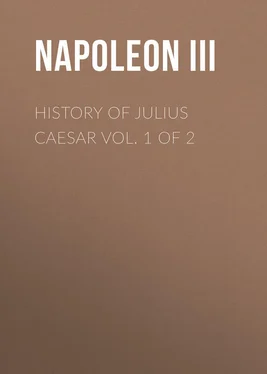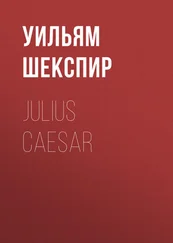Napoleon III - History of Julius Caesar Vol. 1 of 2
Здесь есть возможность читать онлайн «Napoleon III - History of Julius Caesar Vol. 1 of 2» — ознакомительный отрывок электронной книги совершенно бесплатно, а после прочтения отрывка купить полную версию. В некоторых случаях можно слушать аудио, скачать через торрент в формате fb2 и присутствует краткое содержание. Жанр: foreign_antique, foreign_prose, Биографии и Мемуары, на английском языке. Описание произведения, (предисловие) а так же отзывы посетителей доступны на портале библиотеки ЛибКат.
- Название:History of Julius Caesar Vol. 1 of 2
- Автор:
- Жанр:
- Год:неизвестен
- ISBN:нет данных
- Рейтинг книги:5 / 5. Голосов: 1
-
Избранное:Добавить в избранное
- Отзывы:
-
Ваша оценка:
- 100
- 1
- 2
- 3
- 4
- 5
History of Julius Caesar Vol. 1 of 2: краткое содержание, описание и аннотация
Предлагаем к чтению аннотацию, описание, краткое содержание или предисловие (зависит от того, что написал сам автор книги «History of Julius Caesar Vol. 1 of 2»). Если вы не нашли необходимую информацию о книге — напишите в комментариях, мы постараемся отыскать её.
History of Julius Caesar Vol. 1 of 2 — читать онлайн ознакомительный отрывок
Ниже представлен текст книги, разбитый по страницам. Система сохранения места последней прочитанной страницы, позволяет с удобством читать онлайн бесплатно книгу «History of Julius Caesar Vol. 1 of 2», без необходимости каждый раз заново искать на чём Вы остановились. Поставьте закладку, и сможете в любой момент перейти на страницу, на которой закончили чтение.
Интервал:
Закладка:
“In the Roman army the two consuls enjoyed an equal power; but the deference of Agrippa in concentrating the authority in the hands of his colleague, established the unity so necessary for the success of great enterprises.” (Titus Livius, III. 70.) – “The two consuls commanded often both in the day of battle.” (Titus Livius, Battle of Mount Vesuvius , VIII. 9; Battle of Sentinum , X. 27.) – “A fatal innovation; from that time each had in view his personal interest, and not the general interest, preferring to see the Republic experience a check than his colleague covered with glory, and evils without number afflicted the fatherland.” (Dio Cassius, Fragments , LI. edit. Gros.)
98
“They called tribunes of the people those who, from tribunes of the soldiers, which they were first, were charged with the defence of the people during its retreat at Crustumerium.” (Varro, De Lingua Latina , V. 81, edition of O. Müller.)
99
“The discontented obtained from the patricians the confirmation of their magistrates; afterwards they demanded of the Senate the permission to elect annually two plebeians ( ediles ) to second the tribunes in all things in which they might have need of aid, to judge the causes which these might entrust into their hands, to have care of the sacred and public edifices, and to ensure the supplying of the market with provisions.” (Year of Rome 260.) (Dionysius of Halicarnassus, VI. 90.)
100
Dionysius of Halicarnassus, VI. 89.
101
The tribunes oppose the enrolment of troops. (Year of Rome 269.) (Dionysius of Halicarnassus, VIII. 81.) – “Licinius and Sextius re-elected tribunes of the people, allowed no curule magistrate to be elected; and, as the people continued to re-appoint the two tribunes, who always threw out the elections of the military tribunes, the town remained five years deprived of magistrates.” (Year of Rome 378.) (Titus Livius, VI. 35.) – “Each time the consuls convoked the people to confer the consulship on the candidates, the tribunes, in virtue of their powers, prevented the holding of the assemblies. So also, when these assembled the people to make the election, the consuls opposed it, pretending that the right of convoking the people and collecting the suffrages belonged to them alone.” (Year of Rome 271.) (Dionysius of Halicarnassus, VIII. 90.) – “Sometimes the tribunes prevented the patricians from assembling for the election of the interrex, sometimes they forbade the interrex himself making the senatus consultus for the consular comitia.” (Year of Rome 333.) (Titus Livius, IV. 43.)
102
Titus Livius, III. 30.
103
Dionysius of Halicarnassus, X. 31.
104
“The most remarkable event of this year (the year of Rome 282), in which military successes were so nearly balanced, and in which discord broke out in the camp and in the town with so much fury, was the establishment of the comitia by tribes , an innovation which gave to the plebeians the honour of the victory, but little real advantage. In fact, the exclusion of the patricians deprived the comitia of all their pomp, without augmenting the power of the people or diminishing that of the Senate.” (Titus Livius, II. 60.)
105
Assembly of the people both of the town and country; the suffrages were given in it, not by centuries, but by tribes: – “The day of the third market, from an early hour in the morning, the public place was occupied by so great a crowd of country people as had never been seen before. The tribunes assembled the people by tribes, and, dividing the Forum by ropes stretched across, formed as many distinct spaces as there were tribes. Then, for the first time, the Roman people gave its suffrages by tribes, in spite of the opposition of the patricians, who tried to prevent it, and demanded that they should assemble by centuries, according to the ancient custom.” (Year of Rome 263.) (Dionysius of Halicarnassus, VII. 59.) – “From that period (the year 283, consulate of Appius) to our days, the comitia by tribes have elected the tribunes and ediles, without auspices or observation of other auguries. Thus ended the troubles which agitated Rome.” (Dionysius of Halicarnassus, IX. 49.) – “The Roman people, more irritated than ever, demanded that for each tribe a third urn should be added for the town of Rome, in order to put the suffrages in it.” (Year of Rome 308.) (Dionysius of Halicarnassus, XI. 52.)
106
“Duas civitates ex una factas: suos cuique parti magistratus, suas leges esse.” (Titus Livius, II. 44.) – “In fact, we are, as you see yourselves, divided into two towns, one of which is governed by poverty and necessity, and the other by abundance of all things and by pride and insolence.” (Year of Rome 260). ( Speech of Titus Larcius to the envoys of the Volsci , Dionysius of Halicarnassus, VI. 36,)
107
The clients began to vote in the comitia by tribes after the law Valeria Horatia; we see, by the account of Titus Livius (V. 30, 32), that in the time of Camillus the clients and the patricians had already entered the comitia by tribes.
108
Appian, Civil Wars , I. 1.
109
Titus Livius, III. 9.
110
Lectorius, the most aged of the tribunes of the people, spoke of laws which had not been long made. “By the first, which concerned the translation of judgments, the Senate granted to the people the power of judging any one of the patricians.” (Year of Rome 283.) (Dionysius of Halicarnassus, IX. 46.)
111
“The laws voted by the people in the comitia by tribes were to be obligatory on all Romans, and have the same force as those which were made in the comitia by centuries. The pain of death and confiscation was even pronounced against any one who should be convicted of having in anything abrogated or violated this regulation. This new ordinance cut short the old quarrels between the plebeians and the patricians, who refused to obey the laws made by the people, under the pretext that what was decided in the assemblies by tribes was not obligatory on all the town, but only on the plebeians; and that, on the contrary, what was decided in the comitia by centuries became law as well for themselves as for the other citizens.” (Year of Rome 305.) (Dionysius of Halicarnassus, XI. 45.) – “One point always contested between the two orders was to know if the patricians were subjected to the plebiscita . The first care of the consuls was to propose to the comitia assembled by centuries a law to the effect that the decrees of the people assembled by tribes should be laws of the State.” (Year of Rome 305.) (Titus Livius, III. 55.) – “The patricians pretended that they alone had the power of giving laws.” (Titus Livius, III. 31.)
112
“The comitia by curiæ for everything which concerns military affairs; the comitia by centuries for the election of your consuls and of your military tribunes, &c.” (Titus Livius, V. 52.)
113
Aulus Gellius, XV. 27. – Festus, under the words Scitum populi .
114
Titus Livius, IV. 3.
115
“The indignation of the people was extreme, on account of the refusal to take the auspices, as if it had been an object for the reprobation of the immortal gods.” – “The tribune demanded for what reason a plebeian could not be consul, and was told in reply that the plebeians had not the auspices, and that the decemvirs had interdicted marriage between the two orders only to hinder the auspices from being troubled by men of equivocal birth.” (Titus Livius, IV. 6.) – “Now in what hands are the auspices according to the custom of our ancestors? In the hands of the patricians, I think; for the auspices are never taken for the nomination of a plebeian magistrate.” – “Is it not then the same thing as to annihilate the auspices in this city, to take them, in electing plebeian consuls, from the patricians, who alone can observe them?” (Year of Rome 386.) (Titus Livius, VI. 41.)
Читать дальшеИнтервал:
Закладка:
Похожие книги на «History of Julius Caesar Vol. 1 of 2»
Представляем Вашему вниманию похожие книги на «History of Julius Caesar Vol. 1 of 2» списком для выбора. Мы отобрали схожую по названию и смыслу литературу в надежде предоставить читателям больше вариантов отыскать новые, интересные, ещё непрочитанные произведения.
Обсуждение, отзывы о книге «History of Julius Caesar Vol. 1 of 2» и просто собственные мнения читателей. Оставьте ваши комментарии, напишите, что Вы думаете о произведении, его смысле или главных героях. Укажите что конкретно понравилось, а что нет, и почему Вы так считаете.












